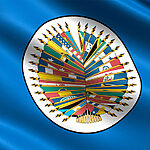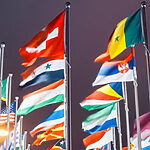Blowing the whistle on wrongdoing
Whistleblowers play an essential role in reporting wrongdoing, exposing abuse and preventing corruption in both the public and private sectors. Giving employees the right to whistleblow and providing adequate protections for whistleblowers is therefore a key feature of transparency and accountability mechanisms within IOs. Offering these protections to employees is essential as they are often the first to become aware of wrongdoing in the workplace. Thus, by encouraging employees to speak out about what they see, hear or experience without fear of reprisals, IOs can better detect and address misconduct or other serious violations of organisational policy.
What is “whistleblowing”?
Whistleblowing refers to the process by which an individual reports wrongdoing within an organisation, such as discrimination, abuse or financial misconduct. Whistleblowing usually relates to serious and widespread concerns within an organisation and should be distinguished from workplace grievances, which are matters of personal interest and do not impact upon the broader organisational culture.
Section 2 of the UN Secretary General’s bulletin (ST/SGB/2017/2/Rev.1) provides that a person who reports the failure of another staff member(s) to comply with their obligations under the UN Charter, Staff Rules or any other relevant administrative issuances, is committing a ‘protected activity’ that entitles them to protection against retaliation. A person who makes reports of unsubstantiated rumours or false information is likely to commit misconduct and could instead be subject to disciplinary proceedings.
Most whistleblowers are motivated by wanting to do the right thing and feel a responsibility to try and correct wrongdoing or abuses of power which they see occurring within their organisation.
Existing Whistleblower Policies
The integral role of whistleblowers and the importance of whistleblower protections is reflected by the adoption of the UN Convention Against Corruption, which has been signed and ratified by 137 nation-states. Support for whistleblowing protections is also evident in the operation of the African Union Convention on Preventing and Combating Corruption and the Organisation of American States Inter-American Convention against Corruption. IOs, such as the Group of Twenty, the Organisation for Economic Cooperation and Development and Asia-Pacific Economic Cooperation, have also been influential in pushing for greater international adoption of whistleblower laws and best practices.
More recently, in response to scandals such as LuxLeaks, Panama Papers and Cambridge Analytica, the EU introduced the Whistleblowing Directive of 2019 which aims to better protect whistleblowers from reprisals. Specifically, the Directive requests member states to implement legislation which requires all companies with 50 or more employees to:
- Establish appropriate reporting channels to enable employees to report breaches of EU law; and
- Ensure that whistleblowers are legally protected against retaliation.
Such protections also extend to member states themselves, who are required to put in place external reporting channels and encouraged to introduce their own protections for those who whistleblow in other areas not covered by the Directive.
IOs do not always provide the same protections as domestic jurisdictions or regional organisations. However, at least with the UN system, all organisations are required to adhere to minimum standards of whistleblower protection, which are outlined in the Secretary General’s bulletin (ST/SGB/2017/2/Rev.1). These standards are also reflected in the rules of various other IOs including but not limited to:
- Annex XXVIII of the Organisation for Economic Cooperation and Development’s Staff Regulations, Rules and Instructions;
- Article 6 of the European Investment Bank Group’s Dignity at Work Policy, as well as in their comprehensive Whistleblowing Policy; and
- Section 22 of the Commonwealth Secretariat’s Staff Handbook.
Applicable Legal Procedures
Reporting Mechanisms
Internal
In addition to their organisation-wide retaliation policy, the UN has a range of reporting mechanisms and internal bodies which are responsible for the protection of whistleblowers. This includes the Office of Internal Oversight Services (OIOS), the assistant secretary-general for human resources management, the head of department or office concerned or the focal point appointed to receive reports of sexual exploitation and abuse.[1] The officer or body that receives the complaint should then review it to determine whether to investigate it themselves or refer it to another entity (such as OIOS or the Ethics Office) for appropriate action.
Outside of the UN Secretariat system, the process for reporting misconduct varies considerably depending upon the organisation. For example, both the World Health Organisation and UN Development Programme require employees to report misconduct to their immediate supervisor, or if they fear retaliation, to the Office of Compliant, Risk Management and Ethics, and the Office of Audit and Investigations respectively. Separate consideration is also given to those employees who wish to keep their identity confidential or make a protected disclosure.
External
At least 18 UN bodies also have organisational policies which allow employees and non-staff member (such as consultants, contractors and implementing partners, as well as UN beneficiaries) to make external reports in cases where there has been significant misconduct or breaches of domestic or international law. However, many of these external reporting mechanisms are quite restrictive, with only the UN High Commissioner for Refugees and UN Relief and Works Agency offering fully comprehensive and independent channels for the external reporting of misconduct. Such policies also vary significantly across each organisation so whistleblowers must ensure that they carefully observe those protocols which are relevant to their organisation.
Protection Against Retaliation
Broad protections against retaliation also exist in in the staff rules of many IOs, such as the Commonwealth Secretariat’s Staff Handbook, which stipulates that whistleblowers will be protected against any retaliation (Section 22.3) and that disciplinary action will be taken against any person who engages in such retaliation (Section 22.6). However, many protections are still insufficient and provide limited or no restitution for whistleblowers. For example, an analysis of the UN Ethics Office revealed that the office had only found in favour of a whistleblower once every six years, despite dealing with nearly 300 cases of alleged retaliation.
Where whistleblowers take their complaint to international administrative tribunals, they also face significant resource gaps, compared with the IO’s general counsel or legal department, who represent the IO against whistleblower allegations. As a result, a recent study found that many whistleblowers are often dismissed as “system-abusers” or “repeaters,” which further discourages employees of IOs from coming forward about abuse or misconduct.
Thus, without adequate protections against retaliation, employees are far less likely to make disclosures, especially given that many are hired on short-term contracts and depend upon their work visa to stay in the host country of their IO. This form of contract puts employees in a far more vulnerable position, as it is possible that making a disclosure could impact upon the renewal of any future contracts.
Tips for the Whistleblower
If you are thinking about whistleblowing, we recommend that you consider the following tips to ensure that you raise your concerns effectively and have the benefit of as many protections as possible whilst doing so:
- Familiarise yourself with the applicable legal procedures and find out what protections are already in place for whistleblowers. If you are working for an IO under the auspices of the UN, you may wish to view this article by Transparency International, which provides a useful summary of existing protections and procedures across a range of organisations. The authors also make some general observations about the UN culture surrounding whistleblowers which may help to inform your decision-making.
- Read your organisation’s staff rules to see if it has its own whistleblowing policy and/or an internal reporting channel. This policy should provide you with some guidance on the types of concerns which are reportable, the process for raising these concerns and the legal protections or restrictions which you may experience. You may find that the whistleblowing policy is a separate document to your organisation’s staff rules. It is also important to keep in mind that many IOs do not define or use the term “whistleblower” in their policies. They may instead refer to staff members who report cases of “misconduct.” Such rules may still be applicable to you and your situation, depending on your individual circumstances. However, this will need to be assessed on a case-by-case basis.
- Consider whether or not you would like to remain anonymous. You may wish to check your organisation’s policy regarding confidentiality, as you may find that they have a duty to keep your identity private. This may even allow you to remain anonymous to the person who is handling your case.
- It is beneficial for yourself and the organisation you work for to try and resolve your complaint through internal processes and procedures. However, you should remind yourself that it is okay to escalate your complaint if no action is taken by your organisation or you suffer reprisals as a result of whistleblowing. If this occurs, we recommend that you obtain independent legal advice to discuss your options and develop a plan moving forward. Despite the existence of many reputable support agencies for whistleblowers,[2] IOs operate in their own world and according to their own procedures, so it is crucial to understand the particularities of their systems.
When considering whether to make a disclosure of misconduct, employees should remind themselves of the vital role that whistleblowing plays in addressing misconduct and preventing corruption from occurring. Within the UN system, “whistleblowers alone account for the uncovering of more fraud and corruption than all other measures of fraud detection combined.”[3]
However, many organisations still lack the necessary protections to support effective whistleblowing without the risk of reprisals. We therefore encourage employees to weigh up the benefits and risks of whistleblowing and seek legal advice if they are unsure of how to make a disclosure or want to find out what protections they are entitled to after making a report.
[1] See Whistleblower Protections at the United Nations by Transparency International (page 5). See also ST/SGB/2017/2/Rev.1, Section 4.
[2] See for example, Whistleblowing International Network, Whistleblower Aid and the Southeast Europe Coalition on Whistleblower Protection.
[3] See Whistleblower Protections at the United Nations by Transparency International (page 3).










